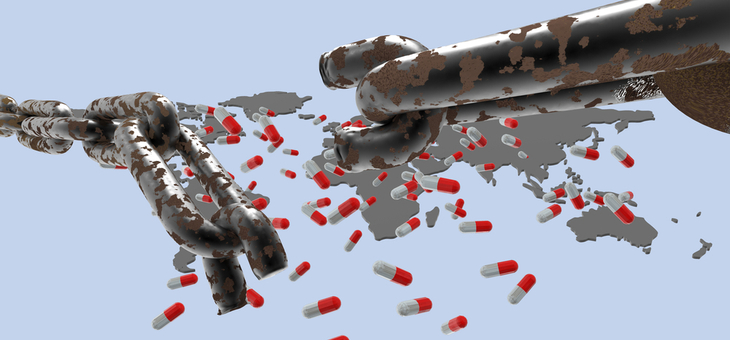Australia’s supply chain and manufacturing network is strong – delivering the goods we need, where we need them every day. But the import of chemicals used to produce medicines could be shaping up to be an area of vulnerability, particularly during the pandemic.
The Vulnerable Supply Chains report, compiled by the federal government’s Productivity Commission (PC), has generally praised the resilience of goods supply networks in Australia during the upheaval of the past 18 months.
“Australia’s supply chains proved generally resilient in response to the COVID-19 pandemic, unexpected trade restrictions, the devastating 2019-20 bushfires and 2021 floods in eastern Australia,” the report says. “Nevertheless, these experiences have highlighted potential vulnerabilities in Australia’s supply chains.”
But the report also identified a key risk area that could expose the country in future – the import of chemicals used to manufacture medicines. As well as posing risks to the nation’s medicine supplies, the report also noted vulnerabilities in importing chemicals used in energy production and water treatment.
Read: Hundreds of meds in short supply
“The main supply chain risks lie in the use of vulnerable chemical imports in health (human medicine manufacturing), energy (petrol and coal product refining) and water treatment industries. Some of these chemical products may be critical,” the report says.
“Australia imports most of its pharmaceutical goods from Europe and the United States, who rely increasingly on active pharmaceutical ingredients (APIs) manufactured in India and China.”
India and China have experienced their own manufacturing disruptions due to COVID-19, affecting supply of the APIs to Europe and the US and, in turn, Australia.
The report says there were concerns at the start of the pandemic that these overseas disruptions might cause real-world shortages of medicine, but that Australia’s supply network had ultimately held firm during 2020 with help from government purchase limits.
Read: Is Australia’s food supply secure?
“During the COVID-19 pandemic, disruptions to Indian and Chinese production of APIs led to concerns of shortages in Australia,” the report says.
“Panic buying and stockpiling ensued and the Australian government implemented purchasing limits to ensure equitable access to medicines. Despite concerns, the Australian pharmaceutical supply chain was strong and stood up well to the challenges posed by the COVID-19 pandemic.”
The report notes a submission by the Therapeutic Goods Administration (TGA) to a Senate Committee on the impact of COVID-19 that says a lack of transparency was to blame for the perception of shortages.
“While pharmaceutical wholesalers may have been in contact with the Therapeutic Goods Administration about supply issues, [information on shortages and wholesale limits] were often not shared more broadly with practitioners at the coalface, such as pharmacists and doctors.”
Read: The ‘impossibility’ of COVID herd immunity as Delta changes the score
In terms of COVID-19 vaccine supply, Australia has an abundance of the AstraZeneca doses but a much more limited supply of the mRNA-based vaccines, Pfizer and Moderna.
But from September, the government assures us that any shortages related to supplies of the mRNA vaccines, whether real or perceived, will be non-existent with a further 10 million doses of each available.
How confident are you in Australia’s medicine supply chains? Do you worry about medicine shortages in the future? Let us know in the comment section below.
If you enjoy our content, don’t keep it to yourself. Share our free eNews with your friends and encourage them to sign up.

